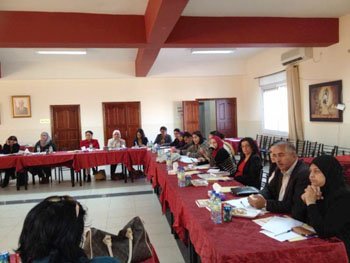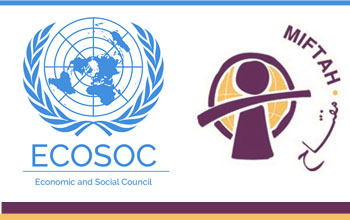
Ramallah – Violence against women has been on the rise in Palestinian society over the past few years and has raised alarm bells among several Palestinian organizations, including MIFTAH, which included the latest data on the subject in one of its most important publications for 2013. The report included an analytical study of a survey on violence in Palestinian society conducted in 2011 by the Palestinian Central Bureau of Statistics. The report is part of MIFTAH’s project of “Gender Equity and Protection” carried out by the organization in cooperation with UNFPA.
MIFTAH organized a dialogue group in coordination with the Palestinian NGO forum to combat violence against women and with the Ministry of Justice. An analytical presentation was conducted on the results of the study, prepared by Mohammed Haj Yehya and which showed horrific findings regarding violence, targeted mostly at women.
According to project manager at MIFTAH, Najwa Yaghi, according to data from the Women’s Center for Legal Aid and Counseling, 27 cases of femicide against the backdrop of so-called ‘honor killings” were recorded throughout this year until now. Yaghi stressed on the need to pinpoint the reasons behind this rise in the level of violence and murder in general in Palestinian society, adding that the overall number of homicides was 97 cases. She said this necessitated laws and deterrent punitive measures to stymie the dangerous trend.
The survey showed that physical, sexual, economic and social violence against married and unmarried women takes place among all age groups or levels of education. At the same time, the scope of violence against women does differ between the different social and demographic groups. Likewise, the level of violence against women at the hands of their husbands is largely linked with increasing levels of family pressure and subjection to violence from the Israeli occupation.
The findings also showed that women from the Gaza Strip who had been married were more susceptible to violence and abuse than their counterparts in the West Bank. Furthermore, women who had been married and who live in urban areas and refugee camps were more targeted by violence and abuse than their counterparts in rural areas.
On his part, Mohammed Haj Yehya presented the study’s recommendations, which were directed at the judicial system, the police, the general prosecution, the judiciary and society at large. He highlighted the duties and responsibilities of these agencies and bodies, which included: the need to acknowledge that the problem of violence against women is a criminal problem and must be dealt with and responded to on the basis of this acknowledgement. Furthermore, lack of intervention by the judicial system in combatting the problem of violence against women sends a message to the victims and the abusers that this is not a criminal problem, if even acknowledged at all. Another recommendation was the need to develop a multi-specialized team to carry out the necessary procedures to file complaints and address cases of violence against women.
The report also included recommendations to improve support services for victims, including family centers, treatment programs for abusive husbands, intervention centers for crisis and emergency cases, daycare centers, home treatment and safe houses and shelters. There was also a recommendation for setting up a national information center in the Ministry of Justice as a database for reference purposes. Furthermore, NGOs, women’s organizations and human rights groups in particular urged towards coordination among each other and with government institutions to conduct a needs-assessment of women victims of domestic violence.
Khan Younis PLC representative Najat Al Astal called for new mechanisms to improve the status of women and provide protection for them in the face of growing violence towards them. She pointed to two draft laws for presentation at the Legislative Council, for which she called for final ratification. The first is entitled “Protection of women from domestic violence” and the second is entitled, the “Penal code draft law”. Al Astal also called for awareness campaigns through the media and the education system in combating domestic violence. “We are also calling for combatting domestic violence to be a priority of the political leadership,” she said.
On her part, Dareen Salhiyeh, head of appeals in the prosecutor general’s office called for a specialized unit of the prosecution to follow up on issues of domestic violence and to learn from the experiences of other countries. Salhiyeh did note however, that the study only focused on violence against wives and suggested that it should cover all domestic violence issues.
Salhiyeh made a number of recommendations to better protect women, including: a witness-protection program, networking system between the relevant ministries, an emergency case system and quick intervention for victims of violence. She also recommended the imposition of restraining orders, the confidential documentation and testimonies of cases of violence, and the ratification of the penal code to take the place of the law enacted in 1960 and which fails to criminalize a number of acts of v violence. Another important recommendation she made was to find a stipulation that would criminalize any failure to report information about cases of violence seen in schools and hospitals, especially following the PCBS report that said only 3% of abused women actually make it to clinics. This is because the only action taken is that their information is documented.
Judge Falasteen Abu Rumi meanwhile, called for allocating lawyers, judges and courtrooms to deal with cases related to women’s issues in order ensure that their full rights are met. She also called for expediting and enacting the ratification of the penal code as a deterrent for those who may commit crimes against women, especially under the so-called guise of ‘honor killings.”






